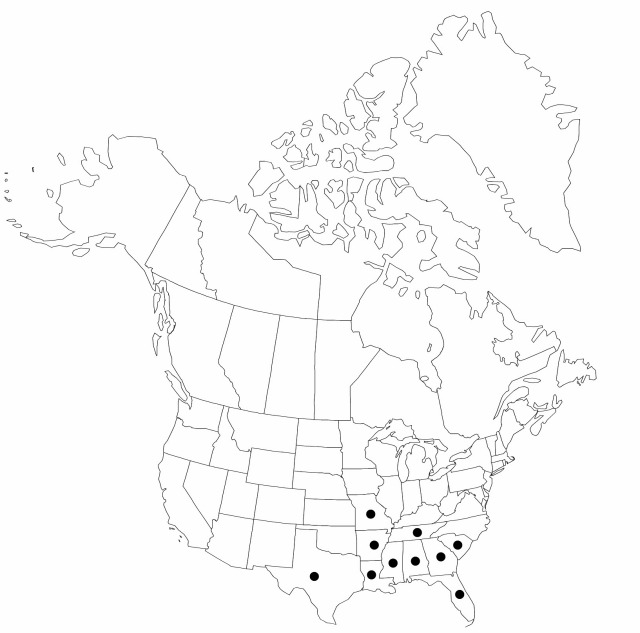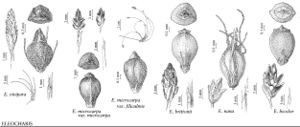Difference between revisions of "Eleocharis brittonii"
Man. S.E. Fl., 164. 1933.
FNA>Volume Importer |
FNA>Volume Importer |
||
| Line 20: | Line 20: | ||
}}<!-- | }}<!-- | ||
| − | --><span class="statement" id="st-undefined" data-properties=""><b>Plants </b>usually annual, tufted, often stoloniferous; rhizomes absent. <b>Culms</b> ascending, quadrangular, sulcate (not sulcate in Eleocharis sp. aff. brittonii), 7–37 cm × 0.2–0.6 mm, soft to firm. <b>Leaves</b>: distal leaf sheaths persistent or fugaceous, pale brown or green, sometimes streaked red-brown, membranous to translucent, apex acute to acuminate. <b>Spikelets</b>: basal spikelets absent; often proliferous, ellipsoid to ovoid, terete, 2–10.5 × 1–2.8 mm, apex acute; proximal scale empty, persistent, amplexicaulous, dissimilar to floral scales, slightly longer, often resembling an involucral bract, elliptic or lanceolate, 1.4–2.7 × 0.8–1.2 mm, apex rounded, midrib markedly thickened and broad; subproximal scale with a flower; floral scales spiraled, 13–76, 9–13 per mm of rachilla, colorless or pale brown, streaked or mottled pale brown to red-brown, midribs sometimes green, ovate, elliptic, or obovate, 0.8–2.2 × 0.5–1 mm, papery or membranous, midrib evident to prominent, apex rounded. <b>Flowers</b>: perianth bristles 5–6 or absent, appressed to achene, white, vestigial to shorter than achene, to 0.3 mm; spinules not evident at 45X; stamens 2–3; anthers 0.2–0.45 mm; styles 3-fid. <b>Achenes</b> grayish to pale olive or yellowish, often minutely brown-spotted, obovoid, trigonous, angles prominent, 0.45–0.8 × 0.3–0.55 mm, apex constricted proximal to tubercle, smooth or finely pitted at 30X. <b>Tubercles</b> gray, green, or yellowish, birettaform, trigonous, 0.05–0.1 × 0.15–0.3 mm. <b>2n</b> = 10.</span><!-- | + | --><span class="statement" id="st-undefined" data-properties=""><b>Plants </b>usually annual, tufted, often stoloniferous; rhizomes absent. <b>Culms</b> ascending, quadrangular, sulcate (not sulcate in <i>Eleocharis</i> sp. aff. brittonii), 7–37 cm × 0.2–0.6 mm, soft to firm. <b>Leaves</b>: distal leaf sheaths persistent or fugaceous, pale brown or green, sometimes streaked red-brown, membranous to translucent, apex acute to acuminate. <b>Spikelets</b>: basal spikelets absent; often proliferous, ellipsoid to ovoid, terete, 2–10.5 × 1–2.8 mm, apex acute; proximal scale empty, persistent, amplexicaulous, dissimilar to floral scales, slightly longer, often resembling an involucral bract, elliptic or lanceolate, 1.4–2.7 × 0.8–1.2 mm, apex rounded, midrib markedly thickened and broad; subproximal scale with a flower; floral scales spiraled, 13–76, 9–13 per mm of rachilla, colorless or pale brown, streaked or mottled pale brown to red-brown, midribs sometimes green, ovate, elliptic, or obovate, 0.8–2.2 × 0.5–1 mm, papery or membranous, midrib evident to prominent, apex rounded. <b>Flowers</b>: perianth bristles 5–6 or absent, appressed to achene, white, vestigial to shorter than achene, to 0.3 mm; spinules not evident at 45X; stamens 2–3; anthers 0.2–0.45 mm; styles 3-fid. <b>Achenes</b> grayish to pale olive or yellowish, often minutely brown-spotted, obovoid, trigonous, angles prominent, 0.45–0.8 × 0.3–0.55 mm, apex constricted proximal to tubercle, smooth or finely pitted at 30X. <b>Tubercles</b> gray, green, or yellowish, birettaform, trigonous, 0.05–0.1 × 0.15–0.3 mm. <b>2n</b> = 10.</span><!-- |
-->{{Treatment/Body | -->{{Treatment/Body | ||
| Line 27: | Line 27: | ||
|elevation=0–100 m | |elevation=0–100 m | ||
|distribution=Ala.;Ark.;Fla.;Ga.;La.;Miss.;Mo.;S.C.;Tenn.;Tex. | |distribution=Ala.;Ark.;Fla.;Ga.;La.;Miss.;Mo.;S.C.;Tenn.;Tex. | ||
| − | |discussion=<p>Preliminary studies suggest that Eleocharis brittonii may be comprised of two entities that may warrant taxonomic recognition, perhaps at the species level. Typical E. brittonii is usually robust, with floral scales pale brown and papery, bristles well developed, and achenes to 0.8 mm, clearly pitted at 30X. It is known from Alabama, Florida, Georgia, Louisiana, Mississippi, New Jersey, and South Carolina. The second variant is usually small with floral scales whitish with red-brown markings, bristles absent or poorly developed, and achenes not more than 0.6 mm, smooth at 30X. We have annotated specimens of this second variant E. sp. aff. brittonii, known from Arkansas, Florida, Georgia, Louisiana, Mississippi, Tennessee, and Texas.</p> | + | |discussion=<p>Preliminary studies suggest that <i>Eleocharis brittonii</i> may be comprised of two entities that may warrant taxonomic recognition, perhaps at the species level. Typical <i>E. brittonii</i> is usually robust, with floral scales pale brown and papery, bristles well developed, and achenes to 0.8 mm, clearly pitted at 30X. It is known from Alabama, Florida, Georgia, Louisiana, Mississippi, New Jersey, and South Carolina. The second variant is usually small with floral scales whitish with red-brown markings, bristles absent or poorly developed, and achenes not more than 0.6 mm, smooth at 30X. We have annotated specimens of this second variant E. sp. aff. brittonii, known from Arkansas, Florida, Georgia, Louisiana, Mississippi, Tennessee, and Texas.</p> |
|tables= | |tables= | ||
|references= | |references= | ||
| Line 51: | Line 51: | ||
|publication year=1933 | |publication year=1933 | ||
|special status= | |special status= | ||
| − | |source xml=https://jpend@bitbucket.org/aafc-mbb/fna-data-curation.git/src/ | + | |source xml=https://jpend@bitbucket.org/aafc-mbb/fna-data-curation.git/src/8f726806613d60c220dc4493de13607dd3150896/coarse_grained_fna_xml/V23/V23_137.xml |
|genus=Eleocharis | |genus=Eleocharis | ||
|subgenus=Eleocharis subg. Eleocharis | |subgenus=Eleocharis subg. Eleocharis | ||
Revision as of 16:05, 18 September 2019
Plants usually annual, tufted, often stoloniferous; rhizomes absent. Culms ascending, quadrangular, sulcate (not sulcate in Eleocharis sp. aff. brittonii), 7–37 cm × 0.2–0.6 mm, soft to firm. Leaves: distal leaf sheaths persistent or fugaceous, pale brown or green, sometimes streaked red-brown, membranous to translucent, apex acute to acuminate. Spikelets: basal spikelets absent; often proliferous, ellipsoid to ovoid, terete, 2–10.5 × 1–2.8 mm, apex acute; proximal scale empty, persistent, amplexicaulous, dissimilar to floral scales, slightly longer, often resembling an involucral bract, elliptic or lanceolate, 1.4–2.7 × 0.8–1.2 mm, apex rounded, midrib markedly thickened and broad; subproximal scale with a flower; floral scales spiraled, 13–76, 9–13 per mm of rachilla, colorless or pale brown, streaked or mottled pale brown to red-brown, midribs sometimes green, ovate, elliptic, or obovate, 0.8–2.2 × 0.5–1 mm, papery or membranous, midrib evident to prominent, apex rounded. Flowers: perianth bristles 5–6 or absent, appressed to achene, white, vestigial to shorter than achene, to 0.3 mm; spinules not evident at 45X; stamens 2–3; anthers 0.2–0.45 mm; styles 3-fid. Achenes grayish to pale olive or yellowish, often minutely brown-spotted, obovoid, trigonous, angles prominent, 0.45–0.8 × 0.3–0.55 mm, apex constricted proximal to tubercle, smooth or finely pitted at 30X. Tubercles gray, green, or yellowish, birettaform, trigonous, 0.05–0.1 × 0.15–0.3 mm. 2n = 10.
Phenology: Fruiting mid spring–winter.
Habitat: Freshwater, moist terrestrial sites, peaty ponds, swamps
Elevation: 0–100 m
Distribution

Ala., Ark., Fla., Ga., La., Miss., Mo., S.C., Tenn., Tex.
Discussion
Preliminary studies suggest that Eleocharis brittonii may be comprised of two entities that may warrant taxonomic recognition, perhaps at the species level. Typical E. brittonii is usually robust, with floral scales pale brown and papery, bristles well developed, and achenes to 0.8 mm, clearly pitted at 30X. It is known from Alabama, Florida, Georgia, Louisiana, Mississippi, New Jersey, and South Carolina. The second variant is usually small with floral scales whitish with red-brown markings, bristles absent or poorly developed, and achenes not more than 0.6 mm, smooth at 30X. We have annotated specimens of this second variant E. sp. aff. brittonii, known from Arkansas, Florida, Georgia, Louisiana, Mississippi, Tennessee, and Texas.
Selected References
None.
